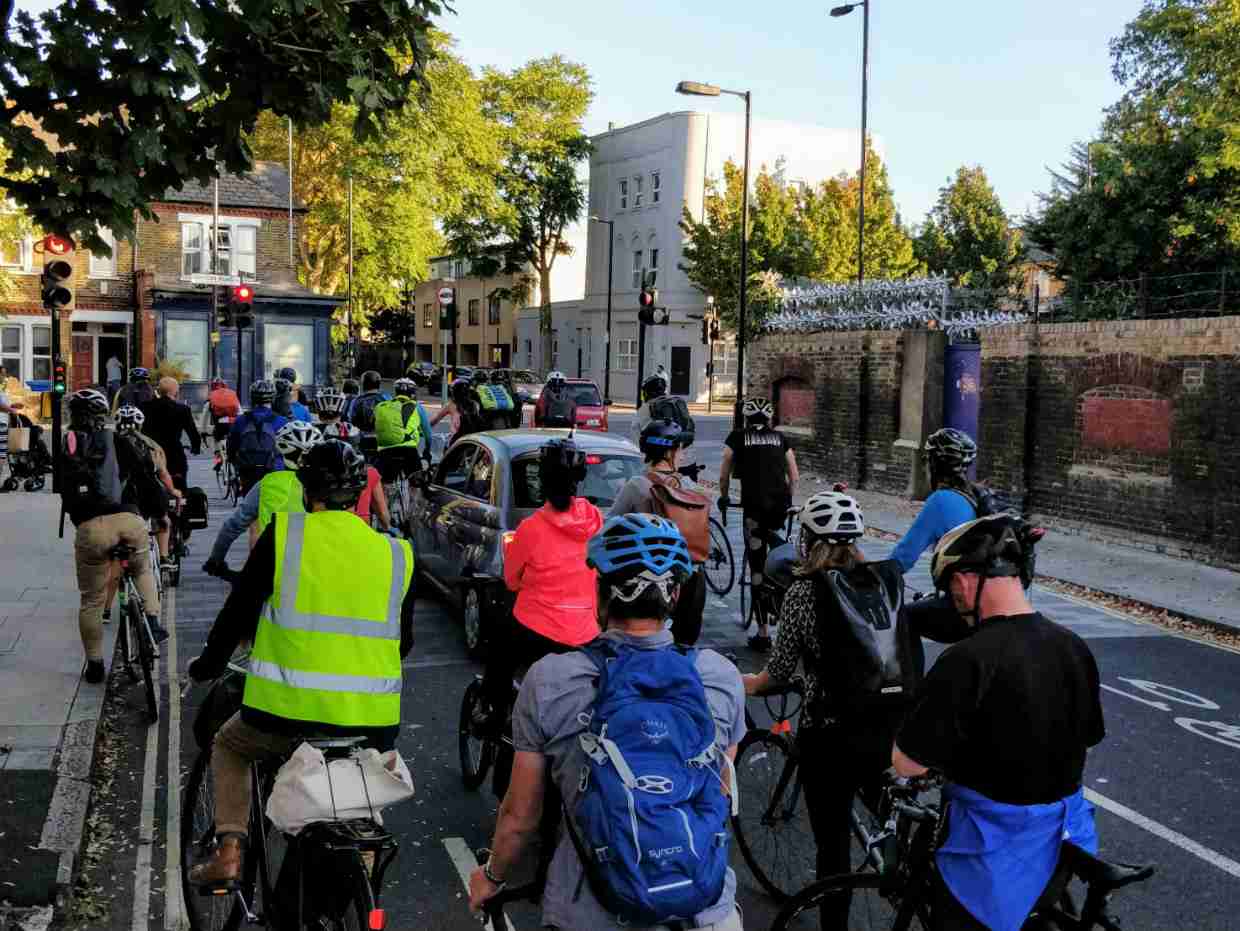
Since this is a life optimisation blog I decided to write about the ultimate self-improvement hack: Cycling. Aside from the fact cycling will make you a better-looking person, it’s also the ultimate money-saving tool. How much can you save cycling to work? Is cycling dangerous?
Often people get obsessed with investment returns and how much money they can make in X years. But people forget that one of the most important things when investing is your initial capital. In other words, the more you save the more you can invest.
When your initial money sum is bigger, you have the luxury of giving yourself a bigger margin of safety and take fewer risks for the same reward.
So, yes. Cycling. I started cycling to work again after 2 years of inactivity, and I find myself happier, healthier and richer :) But let’s speak with numbers.
How much can you save cycling to work?
According to an ONS study, the average UK household spends £79.70 a week on transportation. That includes everything (car purchases, the costs of running a car and public transport).
For the sake of simplicity, let’s say that people only take public transport. That will bring costs down to £30-50 per week. Here in London, it costs me £131 per month just to move in Zones 1-2. Most people live in Zones 2-6, therefore I will assume a monthly cost of £154 (Zones 1-3).
Now let’s see how much cycling would cost you.
Bicycle
I got mine like new for £400 and it normally costs £700. It’s a nice Cannondale, road bike. You can definitely find a new decent and lightweight bike selling for £500. Although my preferred route would be to buy a used one for £300 and give it a good service.
Shoes, Clothing
You don’t have to go full gear from day 1, so trainers are just fine. £60 for a solid pair which you change once a year. Since you’ll quickly fall in love with cycling and you’ll want to cycle in the winter, let’s also add an extra £100 clothing allowance per year.
Tyres
I’m on the mighty Schwalbe Marathon Plus (£30 for two) which strike a nice balance between speed and “puncture-
Service
Change of chain, cassette, tyres, tubes*6, cables plus £50 labour every year:
£180. You can also do it yourself and save the £50 but let’s say you don’t.
Total Cost of Cycling
- Bicycle: £500 upfront one-off
- Accessories (pump, lights, helmet, gloves, lock): £140 upfront
- Shoes: £60 every year
- Service (incl. tyres, tubes): £180 every year

My Google Spreadsheet (To edit, open the file and File -> Save as a copy).
An image is a thousand words indeed! As expected, the first year of cycling is the most expensive one. It will set you back around £1,000 – gear and service included. But, if you, like me need to travel to work 5 days a week, you will anyway pay £1840 a year (£154 a month) on average!
5-year Cycling costs: £2,340
5-year Public Transport costs: £9,216
Total Savings: £6,876
5-year Return On Investment: 294% (!)
Can your fund quadruple its money in 5 years?
How amazing is that? By ‘investing’ an initial £640 to start with a decent bike + gear, you save £6,876 in 5 years time.
Often people argue over which fund outperformed the stock market, and how to best invest. And here we have a simple real-life example of beating the stock market with cycling.
Even if you’re cycling 3 days a week, you STILL benefit from savings, not to mention the other health benefits.
Studies have shown that you also become healthier, prettier and happier at work. I have definitely experienced that first hand. My stress levels are pretty low, and I feel more connected with nature.
Here’s the chart for 3-day cycling commute, and 2 days public transport. Assuming the same fixed costs for cycling.

Even if you cycle to work 3 times a week, that’s £3,869 in savings over 5 years while becoming stronger, healthier and more attractive. Hell, even 1 day a week has a positive ROI compared to public transport in 5 years time.
But I hear you say…. It’s cold and rainy in the winter, do you know where I live, and above all – Cycling is too dangerous. Let’s take things one by one.
Frequently Asked Questions Excuses
1. I don’t have a bike

Well, get one. If you don’t know how to choose, go to 2 different shops and ask for
I’d definitely look on Gumtree or Craigslist for an expensive second-hand one that sells half-price because it is used. Don’t get an expensive new bike. When starting out, it’s good to grow with your gear.
2. My commute is too far
Unless your commuting distance is longer than 10 miles, that’s not a good reason. You will probably spend the same time taking the train/car in peak hours.
If you’re worried about your muscles not making it, I’d say the first month is the hardest. Then your muscles grow and you feel like you’re not exercising enough when they get used to it.
3. It’s cold and rainy in the winter

You have a high chance of getting sick by catching other people’s viruses in the tube. Think of how many people cough or sneeze close to you.
If you don’t believe me, read this study from London Metropolitan University. They shed UV light and found human faeces and drug-resistant superbugs on tube commuters – a total of 121 different types of bacteria from just 80 swabs. Buy a bike and stay infection-free!
4. Cycling is too dangerous
Ok, I will admit this is a valid concern. We’ve seen headlines of cyclists killed by lorries which made me think I should not cycle ever again.
If you think the roads are too dangerous to cycle on, then you belong to the 62% of people who Agree/Strongly Agree with that statement. 22% only Disagree/Strongly Disagree and 16% are neutral.
But again, I decided to skip the noise and have a deep look at the numbers. Since this is a huge topic, I decided to write a whole new section on it.
How dangerous is Cycling on the road?
In London: On average, from 1986 to 2010, 17.2 cyclists died per year. I’m not saying this is a trivial amount, but life is risky in general. Let’s have a look at more recent numbers.
| Type | 2005-2009 | 2013 | 2014 | 2015 | 2016 |
| Pedestrians | 96 | 65 | 64 | 66 | 61 |
| Pedal cyclist | 16.6 | 14 | 13 | 9 | 8 |
| Powered two-wheeler | 43.4 | 22 | 27 | 36 | 33 |
| Car occupants | 49.4 | 25 | 19 | 20 | 10 |
| Bus/coach occupants | 2.4 | 1 | 0 | 1 | 1 |
| Other vehicles | 3.2 | 5 | 4 | 4 | 3 |
| Total | 211 | 132 | 127 | 136 | 116 |
As we can see from the numbers, the absolute number of people dying on a bike is going down. That’s in line with other modes of transport because thankfully, it looks like our roads are becoming safer over time.
That’s despite the fact that “the number of journeys cycled has almost doubled since 2005 to 668,000 journeys each day”.
But the engineer inside me screams: Absolute numbers tell me nothing, Michael! What if there are not so many people cycling compared to pedestrians or cars? I can see that there are many more pedestrian deaths, but obviously, there must be more people walking than cycling.
Yes, fair point. Which is why I want to see how many people die compared to other forms of transport adjusted for equal journey lengths.
How risky is cycling compared to other forms of transport per mile travelled?

Now we’re talking.
Adjusting for equal miles travelled, cyclists belong to the vulnerable road user groups that have the highest chance of getting slightly injured. As expected, cycling along with motorbiking are the most vulnerable.
However, the figures suggest that pedestrians were more likely than cyclists to be killed on the roads. Cycling and walking, however, are both riskier than car driving, although motorcycling is the riskiest kind of transport of all – around 3 – 3.5 times more so than walking or cycling.
To quote the research: “The pattern for pedal cycles is an interesting one: The overall casualty rate of around 5,400 casualties per billion miles cycled is close to the motorcycling casualty rate, whereas the fatality rate of 29.5 per billion miles cycled is much closer to the pedestrian rate”.
I’m not trying to paint a rosy picture here or massage the numbers. These are real stats straight from TFL data.
How to protect yourself when cycling
I believe one can make a huge difference by taking a few simple steps when cycling.
How to become a safer cyclist
- Take quiet roads if possible
CityMapper has a ‘quiet’ route option for cyclists and TFL suggests you follow the Cycle Highways and QuietWays which are absolutely amazing
- Always wear a helmet
- Do NOT listen to podcasts or music while cycling (hi Vlad!)
- Wear shiny clothes and have lights at night
- Don’t overtake big trucks in any way
The biggest one for me is to take quiet routes if possible. I hardly meet any cars when on those Quietways and I love the fact that hundreds of other cyclists are next to you. You’re safer in a group plus there’s less pollution on those streets.
The Benefits of Cycling
Cycling beats the stock market, but life is not about money. Life is about maximising happiness and optimising your everyday life.
Which is why I want to talk about the ‘other’ benefits cycling will bring to you if you give it a chance.
Cycling improves your mood
Although there are many surveys to prove that cycling makes you a happier person, reduces stress levels, and improves your psychological wellbeing, I don’t need to read any. It’s so evident to me that cycling makes me happier, that I stopped having this lazy feeling when it’s time to leave for work.
Also when at work, I feel more energetic and in simple words, more ‘awake’ compared to other people and my non-cycling self.
Cycling makes you live longer
Physical exercise, apart from the psychological boost, makes you live longer. Simple as that. If you can combine exercise and travel time then you have the best of both worlds.
You don’t cycle because you are healthy, you are healthy because you cycle. As a person who doesn’t like the gym, I totally find cycling the best way to cardio 5 days a week.
Physical inactivity will kill you much faster given the recent obesity levels and heart-related diseases.
You’re making your town safer
The more people cycle, the safer your city will be, as I constantly find that drivers are much more willing to pay attention or give priority to a group of cyclists rather than me alone.
Higher numbers will also force the transport organizations to improve the safety for
You’re always on time
Ok, you get the occasional puncture. But you don’t depend on trains that sometimes are delayed or run on fixed schedule.
Tube line closures or strikes do not affect you. You’re in a position of power, similar to how financial independence feels like when it comes to your wallet.
You’re healthier despite the fumes
That was the only thing that worried me for a long time. Am I benefiting from cycling if there’s pollution in the streets?
Looks like the benefits outweigh the risks. If you follow quiet roads the following argument is much stronger.
To quote Guardian: “The good, if simple, answer from pollution experts is: yes. Cycling does remain many, many times better for your health than not cycling, even factoring in exposure to pollution and the risk of accident.”
Final Verdict: Are you in the top 2.8%?
741,000 working people aged 16 to 74 cycled to work in 2011, an increase of 90,000 on 2001 – however, as a proportion of working residents, the share cycling to work was unchanged at 2.8%, analysis by the ONS shows.
When talking about financial independence and the option to stop working in your 30s or 40s because you have enough money coming in, I’m not surprised people make fun of the movement.

“Oh, you have to chop your own woods to heat your house in order to FIRE”.
But if you look at the numbers, and optimise your life towards efficiency, earnings potential and passive investing, then financial independence becomes inevitable!
And who are those people? They are the 0.1%. If you’re reading this, you’ve already taken steps to improve your life. You’re already part of the 0.1%!
People don’t look at the numbers and keep doing what they used to. And as the saying goes:
If you always do what you’ve always done you will always get what you’ve always got.
So, fear not and join the 2.8% ;)









12 thoughts on “Beating the Stock Market with… Cycling. And is it risky?”
Great details post Foxy!
I’ve not had a car now for almost 2 years – just have the trusty ol’ Brompton (which I got discounted due to a friend working there!). I too have the Schwalbe Marathon Plus tyres fitted, nothing is worse than getting a flat on your morning commute! Although I am guilty of overtaking slow vans and lorries D:
An additional benefit from cycling, for me, is that you save additional time which you would have either spent at the gym or working out at home. I used to exercise each day, but now that I’m cycling each day, I only need to do specific workouts once or twice a week. The extra time I get to work on my blog or other side-hustles equates to lots more income and additional savings!
Thanks Ninja! Indeed, very important point if you can combine travel time with exercise.
This is a huge time saver as you also pointed out. I’m not feeling guilty anymore of not exercising enough. However, let’s be honest it’s not as intense as a gym workout would be. But its good cardio, and above all it’s consistent!
I walk to work, which ends up being a lot cheaper than cycling!
Hehe good for you! Unfortunately, not an option for me.
There is statistical danger and then there is what is safe for me. I rode a lot when I was younger and I hit two cars, one head on and one I T-boned. That resulted in concussion, amnesia, broken bones and mangled bicycles. I also flipped the bike or slid it sideways a few times leaving me with a number of impressive lifetime scars. Then there were the puncture wounds from that dog. And the grass stains from that other dog that drug me and my bike around on his lawn, he was a rather formidable beast. And the time I went swimming when that puddle, I thought, was actually several feet deep. I’m just saying that I’m probably a danger to myself and society on a bike. But great post for normal people!
For real??? Stay away from bikes, Steveark!!! :)
So true – great post! I started cycling to work 2 days a week a year ago and it’s so much more stress free – I have zero delays due to transport/traffic issues on those days! I was also a bit worried about the rates of bike theft in London so spent £200 on a new (but not high end) bike – it seems to do the job just fine. I take the tube the rest of the time as I work in different locations and always listen to podcasts on various useful topics on those commutes – really cuts out the amount of dead time you waste. Much happier as a result too!
Thanks for sharing, Smitha! I also worry about the high rate of bike theft especially in London. I thought of taking insurance but then I decided not to and I just avoid leaving it in public places too often. It’s a trade-off.
My workplace offers a nice shed so I only lock it in public probably once every 3 months or so.
Entirely agree with you!
Cycling is a great win-win situation, which healthy, saves money and good for city air!
I bike since one year now and I am going to invest in a better bike. A cheap bike a good thief repellant but can be hard on your back / wrists when used every day.
I am hesitating between an Ortler Motala (with Nexus 7 and roller brakes, a bit heavy maybe) and a Vitus Mach 3 Tourney which is more a road bike with disc brakes.
If you have any opinion about that…
Thanks for the great post, currently using it to convince my wife to start biking.
Thanks for sharing, Frenchie. Looks like you’re based in France? Here in the UK you can register your bike with the police and they tag it with an invisible mark as well as a visible sticker. That probably helps a bit to deter thieves.
Not sure which of the two bikes to go for. I’d pick the more lightweight one, but again I’m not an expert.
I am in the camp with no thanks. I live up a steep hill (10% incline), 8 km away from work, with only one access road for about 4 km. That road is a regional one with lots of cars, huge incline and lots of trucks. That area has the most car fatalities in the region. In winter, temperatures go up to -20 degrees with heavy snow, and I can see lots of “good drivers” with their broken cars on the side of the road, because they were going to fast.
Cycling can be done, but I think the risk cost/benefits ratio makes it an insane proposition.
Fair enough, Raluca. I guess personal circumstances are different for everyone. The majority of people I come across could definitely benefit from some cycling in their lives.